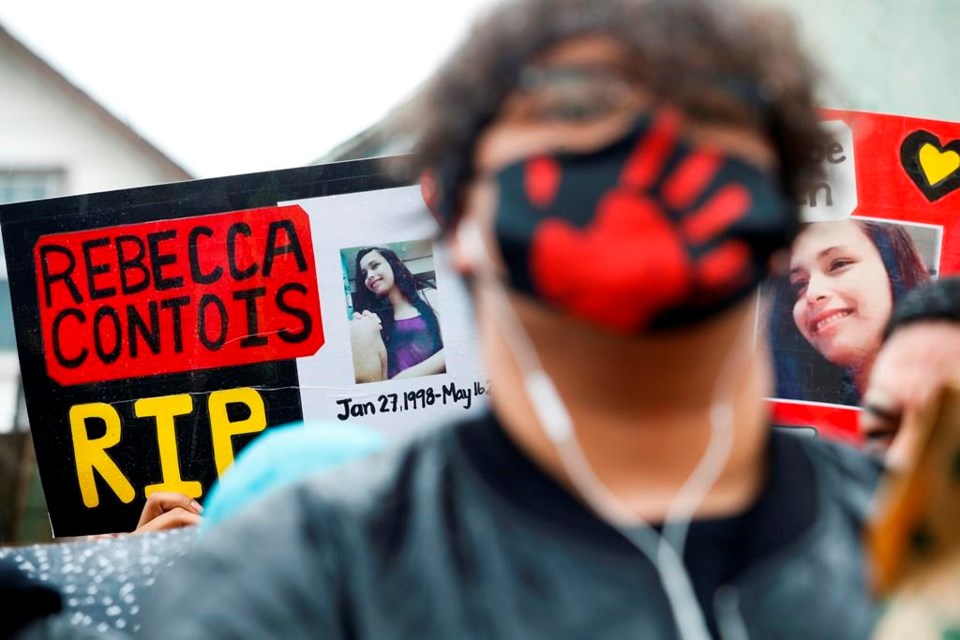WINNIPEG ŌĆö The trial of admitted serial killer Jeremy Skibicki heard details Friday about the exhaustive search by police to find the remains of one of his four victims.┬Ā
Police Const. Brian Neumann testified officers searched an area of Winnipeg's Brady Road landfill for three weeks before finding the partial remains of Rebecca Contois on June 14, 2022.┬Ā
Neumann, an officer supervising officers the search, was on-site when he got the radio call that the team had found something.
"My initial trip out there was just to see what they had ... I observed what was believed to be human remains," he said.
GRAPHIC WARNING: The following details may disturb some readers.
A woman's torso was found wrapped in pieces of black plastic, a multicoloured sheet and a knitted blanket. A pathologist confirmed it was Contois.
Skibicki, 37, is charged with first-degree murder for the killings of Contois, Morgan Harris, Marcedes Myran and an unidentified women Indigenous leaders have named Mashkode Bizhiki'ikwe, or Buffalo Woman.
Only the remains of Contois have been found.
Skibicki, a self-proclaimed white supremacist, has confessed to the slayings, but his lawyers are arguing that he's not criminally responsible due to mental illness.┬Ā
The Crown has said the killings were racially motivated and that Skibicki preyed on the vulnerable Indigenous women at homeless shelters. He assaulted the women, strangled or drowned them and disposed of their bodies in garbage bins. Two were dismembered.
Officers determined some of Contois's remains had been sent to Brady Road landfill. Police alerted the city-run landfill and an area was cordoned off.
Search-and-rescue officers and a drone unit, as well as landfill employees, joined the search team, said Neumann.
Outfitted with protective suits, boots and full-face respirator masks, they set out each day looking through about a hectare of mounds of refuse.
They relied on GPS co-ordinates and video cameras from garbage trucks to narrow the search.
"We had a very strong idea we were in the right area," said Neumann.
Some of Contois's relatives left the courtroom during the officer's testimony.
Neumann said evidence also led police to believe the remains of Harris and Myran were in a different, privately run landfill outside the city. Skibicki had looked up garbage pickup schedules before disposing of the remains.
Surveillance video from Skibicki's neighbourhood showed someone disposing of items in a garbage bin weeks earlier, on May 3 and 6. The bin was collected May 16 and taken to the Prairie Green landfill, said Neumann.
He said he canvassed the area with a drone photographer. Delivery was stopped in an area of interest at the landfill on June 20, and it hasn't been used since.┬Ā
The officer said a possible search of Prairie Green was compared with the successful search at the Brady landfill. Trucks that went to Prairie Green were not equipped with GPS or video surveillance.
The length of time the remains of the two women had been there, combined with the warm spring weather, increased the likelihood of decomposition, said Neumann.
As well, 10,077 loads of waste had been deposited at Prairie Green from May 16 to June 20. A search would require going through a pile of refuse about 12 metres high.
Shortly after Skibicki's arrest in December for the deaths of Harris, Myran and Buffalo Woman, police announced they would not search the Prairie Green landfill, citing safety concerns and the passage of time.
Countrywide protests were held, led by the families of Myran and Harris. Last month, the federal and Manitoba governments committed a combined $40 million for a search of the Prairie Green landfill.
Police have not said where the remains of Buffalo Woman may be.
The federal government has a support line for those affected by the issue of missing and murdered Indigenous women and girls: 1-844-413-6649. The Hope for Wellness Helpline, with support in Cree, Ojibway and Inuktitut, is also available to all Indigenous people in Canada: 1-855-242-3310.
This report by The 91įŁ┤┤ Press was first published May 10, 2024.
Brittany Hobson, The 91įŁ┤┤ Press



